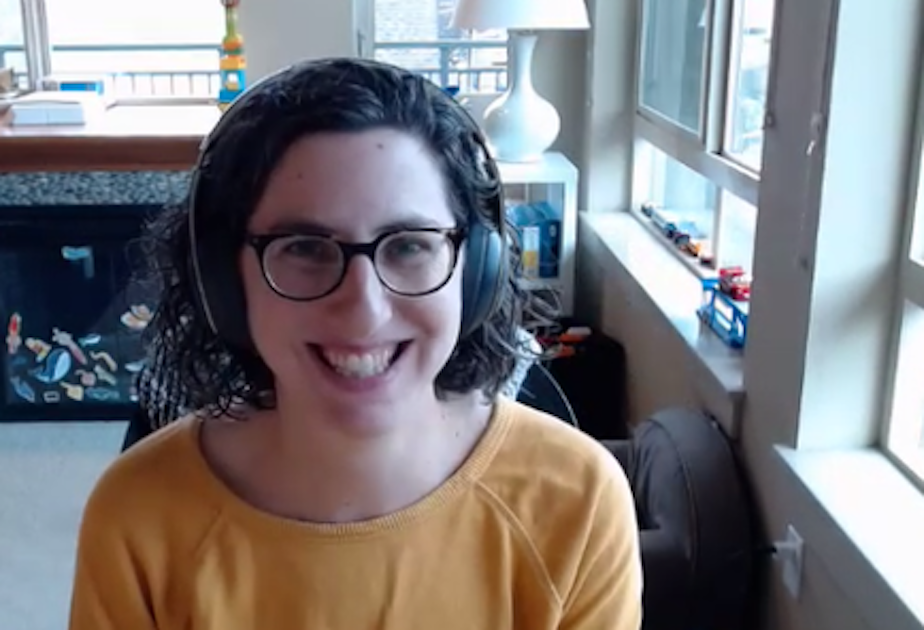Parler sues Amazon after the tech giant boots the app from its servers

This week, Seattle tech-giant Amazon pulled the plug on Parler, the upstart social media site that has been a growing favorite with Trump supporters.
Amazon had been hosting the site through its cloud services. It decided to shut off Parler's service over the weekend, due to what Amazon calls "a steady increase in violent content.” Parler has since filed a lawsuit against Amazon for doing so.
Karen Weise covers technology for the New York Times. She breaks the story down for us.
This interview has been edited for clarity.
This story has been changing rapidly. What's the latest?
The latest is this lawsuit that Parler filed yesterday. It's not clear how whether the lawsuit will continue because it's kind of a little bit of a bumbling lawsuit. They filed it saying we want Amazon to not kick us off their cloud computing platform, but they filed it after they were already kicked off. Then, they didn't serve Amazon with the proper court documents. The judge gave them until the end of the day yesterday to do that.
As of now, there's not any indication that they have done that. They may have, but the court docket doesn't say so yet. We'll see if they actually continue with this lawsuit or not.
What more can you tell us about Amazon’s decision? What's the company saying?
Sponsored
Amazon generally does not closely moderate what their customers are doing on their cloud computing platforms. They basically said that they have had regular communication with Parler for weeks about concerning content that might be encouraging or inciting violence on Parler and that Parler has not been able to, or willing to fully moderate the form of content that violates Amazon's own terms and services.
That's why they gave Parler this deadline. Basically, they kicked them off. They said they will preserve your data so you can migrate to a new server, but ultimately, you can't be on ours.
Over the last few days, we've seen Twitter permanently ban President Trump. Facebook and Instagram also have banned him indefinitely from using their services. What do you make of the social media companies now taking action like this?
There are several schools of thought about this. One is that the violence that we saw at the Capitol was a breaking point and that the President's contemporaneous posting on various social media platforms encouraged more violence.
The other school of thought is that it's an expedient time to finally do something that should have been done a while ago-- that he had been talking in aggressive and, at times, nearly violent words on these various platforms. They had been so hesitant to do so. Now that he's on his way out, they've been more aggressive.
Sponsored
Then there's actually a third school of thought which says he shouldn't have been kicked off, that more speech is good speech, and that it's sort of a First Amendment issue. Though, the First Amendment covers government actors clamping down on speech versus a private actor, like Twitter or Facebook.
President Trump’s supporters and some other Republicans, other conservatives, are calling this move censorship, even though, as you say, private companies can decide who they provide service to. What kinds of reactions are you seeing on that side of the fence to these decisions?
This is having a kind of interesting intersection with all of the antitrust debates we've been seeing in Washington, and broader-- that while censorship is really about a government prohibiting speech, these social networks are so large that they kind of function as a utility and no one company should have this control and this reach.
That was the argument Parler was sort of trying to make in this Amazon case—that Amazon is this kind of dominant cloud computing provider, and that by being kicked off it will be their death knell. That might overstate it. Parler is finding new hosting, it sounds like, as we speak, but it dovetails with the scale of these networks. Are they too big, where it requires additional regulation?
Is this whole situation just pushing us faster towards an actual debate about regulating social media and the government's role in that?
Sponsored
Laws about social media that oversee what is allowed, or is not allowed, are really old and long predate this form of technology. I think there is an awareness that there needs to be an update. There's a provision called Section 230 that has been at the center of this debate about whether or not the social media networks have a responsibility for the language and the words that are on their platforms like a publisher does. They say they're just the wires.
It's pretty clear I think, for most people, that we need some form of an update. How far it goes or where it goes is really what I think the debates will focus on going forward. It's one of those wonky debates that, in the end, will have a potentially big impact depending on how sweeping the changes are.
Listen to the interview by clicking the play button above.





